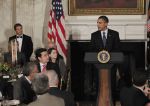by Julie Pace
PANAMA CITY BEACH, Fla. (AP)—Weighing his words carefully on a fiery political issue, President Barack Obama said Aug. 14 that Muslims have the right to build a mosque near New York’s Ground Zero, but he did not say whether he believes it is a good idea to do so.
Obama commented during a trip to Florida, where he expanded on a Friday night White House speech asserting that Muslims have the same right to freedom of religion as everyone else in America.
The president’s statements thrust him squarely into a debate he had skirted for weeks and could put Democrats on the spot three months before midterm elections where they already were nervous about holding control of the House and maybe even the Senate. Until Friday, the White House had asserted that it did not want to get involved in local decision-making.
The White House quickly followed up on Obama’s latest comments on the matter, with Obama spokesman Bill Burton saying that the president wasn’t backing off in any way from the remarks he made Friday.
“What he said last night, and reaffirmed today, is that if a church, a synagogue or a Hindu temple can be built on a site, you simply cannot deny that right to those who want to build a mosque,” Burton said.
New York City Mayor Michael Bloomberg, an independent who has been a strong supporter of the mosque, welcomed Obama’s White House speech as a “clarion defense of the freedom of religion.”
Florida Gov. Charlie Crist, who was among those who met with Obama on Saturday, lauded the president’s position. Crist is running for the U.S. Senate as an independent.
“I think he’s right—we’re a country that in my view stands for freedom of religion and respect for others,” Crist said after the Florida meeting with Obama and other officials. “I know there are sensitivities and I understand them. This is a place where you’re supposed to be able to practice your religion without the government telling you you can’t.”
Others were quick to pounce on Obama’s statements.
In a statement Saturday, House Minority Leader John Boehner said the decision to build the mosque wasn’t an issue of religious freedom, but a matter of respect.
“The fact that someone has the right to do something doesn’t necessarily make it the right thing to do,” Boehner said. “That is the essence of tolerance, peace and understanding.”
The mosque would be part of a $100 million Islamic community center two blocks from where nearly 3,000 people perished when hijacked jetliners slammed into the World Trade Center towers on Sept. 11, 2001.
The proposed construction has sparked debate around the country.
Speaking to a gathering at the White House Aug. 13 to observe the Islamic holy month of Ramadan, Obama said that he believes “Muslims have the same right to practice their religion as everyone else in this country.”
“That includes the right to build a place of worship and a community center on private property in lower Manhattan, in accordance with local laws and ordinances,” he said. “This is America, and our commitment to religious freedom must be unshakable.”
Asked Saturday about the issue, Obama said: “My intention was simply to let people know what I thought. Which was that in this country we treat everybody equally and in accordance with the law, regardless of race, regardless of religion.”
Some relatives of people killed in the Sept. 11 attacks supported Obama’s comments.
The mosque is “in many ways … a fitting tribute,” said Colleen Kelly of the Bronx, who lost her brother Bill Kelly Jr. in the attacks.
“This is the voice of Islam that I believe needs a wider audience,” said Kelly, who is Catholic. “This is what moderate Islam is all about.”
Opinions are mixed among family members.
Sally Regenhard, whose firefighter son was killed at the World Trade Center, has said the president’s comments show “a gross lack of sensitivity to the 9/11 families and to the people who were lost.”
When Obama first took office, Muslim leaders had high hopes from his presidency, even as he kept his distance from them during the campaign. Their expectations were raised further after a June 2009 speech in Cairo, where Obama said he wanted to forge a relationship between the U.S. and Muslims based on respect and partnerships with the private sector and civil society.
But many leaders have since become disappointed in the president, believing he has mostly kept his outreach to their community behind the scenes. Many Muslims had also hoped he would reverse several Bush administration policies they felt unfairly targeted them after the Sept. 11 attacks, such as no-fly lists and the Patriot Act.
